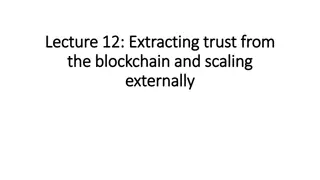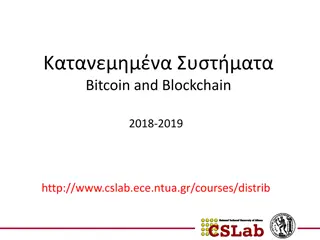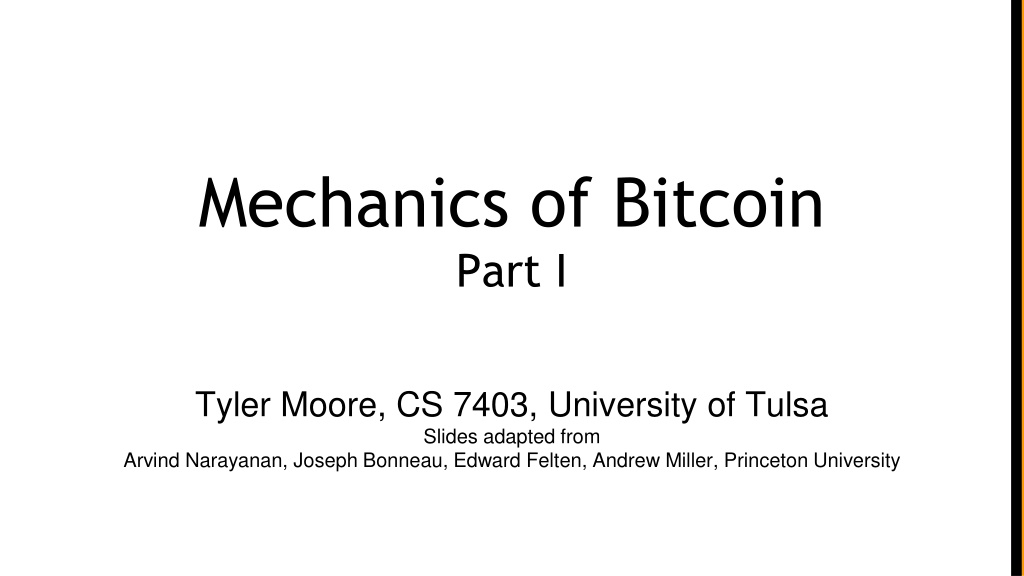
Understanding Mechanics of Bitcoin Transactions
Explore the mechanics of Bitcoin transactions, including Bitcoin consensus, account-based ledger vs. transaction-based ledger, merging value, joint payments, and a real Bitcoin transaction example. Dive into the key concepts and processes involved in Bitcoin transactions.
Download Presentation

Please find below an Image/Link to download the presentation.
The content on the website is provided AS IS for your information and personal use only. It may not be sold, licensed, or shared on other websites without obtaining consent from the author. If you encounter any issues during the download, it is possible that the publisher has removed the file from their server.
You are allowed to download the files provided on this website for personal or commercial use, subject to the condition that they are used lawfully. All files are the property of their respective owners.
The content on the website is provided AS IS for your information and personal use only. It may not be sold, licensed, or shared on other websites without obtaining consent from the author.
E N D
Presentation Transcript
Mechanics of Bitcoin Part I Tyler Moore, CS 7403, University of Tulsa Slides adapted from Arvind Narayanan, Joseph Bonneau, Edward Felten, Andrew Miller, Princeton University
Recap: Bitcoin consensus Bitcoin consensus gives us: Append-only ledger Decentralized consensus Miners to validate transactions assuming a currency exists to motivate miners!
An account-based ledger (not Bitcoin) time might need to scan backwards until genesis! Create 25 coins and credit to AliceASSERTED BY MINERS Transfer 17 coins from Alice to BobSIGNED(Alice) Transfer 8 coins from Bob to CarolSIGNED(Bob) Transfer 5 coins from Carol to AliceSIGNED(Carol) is this valid? Transfer 15 coins from Alice to DavidSIGNED(Alice) SIMPLIFICATION: only one transaction per block
A transaction-based ledger (Bitcoin) 1 Inputs: Outputs: 25.0 Alice time we implement this with hash pointers change address 2 Inputs: 1[0] Outputs: 17.0 Bob, 8.0 Alice SIGNED(Alice) finite scan to check for validity 3 Inputs: 2[0] Outputs: 8.0 Carol, 9.0 Bob SIGNED(Bob) 4 Inputs: 2[1] Outputs: 6.0 David, 2.0 Alice is this valid? SIGNED(Alice) SIMPLIFICATION: only one transaction per block
Merging value time 1 Inputs: ... Outputs: 17.0 Bob, 8.0 Alice SIGNED(Alice) ... 2 Inputs: 1[1] Outputs: 6.0 Carol, 2.0 Bob SIGNED(Carol) ... Inputs: 1[0], 2[1] 3 Outputs: 19.0 Bob SIGNED(Bob) SIMPLIFICATION: only one transaction per block
Joint payments time 1 Inputs: ... Outputs: 17.0 Bob, 8.0 Alice SIGNED(Alice) ... 2 Inputs: 1[1] Outputs: 6.0 Carol, 2.0 Bob SIGNED(Carol) ... Inputs: 2[0], 2[1] 3 two signatures! Outputs: 8.0 David SIGNED(Carol), SIGNED(Bob) SIMPLIFICATION: only one transaction per block
The real deal: a Bitcoin transaction { "hash":"5a42590fbe0a90ee8e8747244d6c84f0db1a3a24e8f1b95b10c9e050990b8b6b", "ver":1, "vin_sz":2, "vout_sz":1, "lock_time":0, "size":404, "in":[ { "prev_out":{ "hash":"3be4ac9728a0823cf5e2deb2e86fc0bd2aa503a91d307b42ba76117d79280260", "n":0 }, "scriptSig":"30440..." }, { "prev_out":{ "hash":"7508e6ab259b4df0fd5147bab0c949d81473db4518f81afc5c3f52f91ff6b34e", "n":0 }, "scriptSig":"3f3a4ce81...." } ], "out":[ { "value":"10.12287097", "scriptPubKey":"OP_DUP OP_HASH160 69e02e18b5705a05dd6b28ed517716c894b3d42e OP_EQUALVERIFY OP_CHECKSIG" } ] } metadata input(s) output(s)
The real deal: transaction metadata { "hash":"5a42590...b8b6b", "ver":1, "vin_sz":2, "vout_sz":1, "lock_time":0, "size":404, ... } transaction hash housekeeping not valid before housekeeping
The real deal: transaction inputs "in":[ { "prev_out":{ "hash":"3be4...80260", "n":0 }, "scriptSig":"30440....3f3a4ce81" }, ... ], previous transaction signature (more inputs)
The real deal: transaction outputs "out":[ { "value":"10.12287097", "scriptPubKey":"OP_DUP OP_HASH160 69e...3d42e OP_EQUALVERIFY OP_CHECKSIG" }, ... ] output value recipient address?? more on this soon... (more outputs)
Output addresses are really scripts OP_DUP OP_HASH160 69e02e18... OP_EQUALVERIFY OP_CHECKSIG
Input addresses are also scripts 30440220... 0467d2c9... scriptSig OP_DUP OP_HASH160 69e02e18... OP_EQUALVERIFY OP_CHECKSIG scriptPubKey TO VERIFY: Concatenated script must execute completely with no errors
Bitcoin scripting language (Script) Design goals Built for Bitcoin (inspired by Forth) Simple, compact Support for cryptography Stack-based Limits on time/memory No looping I am not impressed image via Jessie St. Amand
Common Script Operations OP_DUP Duplicates the top item on the stack Hashes twice: first using SHA-256 and then RIPEMD- 160 OP_HASH160 Returns true if the inputs are equal. Returns false and marks the transaction as invalid if they are unequal OP_EQUALVERIFY Checks that the input signature is a valid signature using the input public key for the hash of the current transaction OP_CHECKMULTISIG Checks that the k signatures on the transaction are valid signatures from k of the specified public keys. OP_CHECKSIG
Bitcoin script execution example <pubKey> true <pubKeyHash?> <pubKey> <pubKeyHash> <sig> <sig> <pubKey> OP_DUP OP_HASH160 <pubKeyHash?> OP_EQUALVERIFY OP_CHECKSIG
Bitcoin script instructions 256 opcodes total (15 disabled, 75 reserved) Arithmetic If/then Logic/data handling Crypto! Hashes Signature verification Multi-signature verification
OP_CHECKMULTISIG Built-in support for joint signatures Specify n public keys Specify t Verification requires t signatures BUG ALERT: Extra data value popped from the stack and ignored
Bitcoin blocks Why bundle transactions together? Single unit of work for miners Limit length of hash-chain of blocks Faster to verify history
Bitcoin block structure Hash chain of blocks prev: H( ) prev: H( ) prev: H( ) trans: H( ) trans: H( ) trans: H( ) H( ) H( ) Hash tree (Merkle tree) of transactions in each block H( ) H( ) H( ) H( ) transaction transaction transaction transaction
The real deal: a Bitcoin block { "hash":"00000000000000001aad2...", "ver":2, "prev_block":"00000000000000003043...", "time":1391279636, "bits":419558700, "nonce":459459841, "mrkl_root":"89776...", "n_tx":354, "size":181520, "tx":[ ... ], "mrkl_tree":[ "6bd5eb25...", ... "89776cdb..." ] } transaction data block header
The real deal: a Bitcoin block header { "hash":"00000000000000001aad2...", "ver":2, "prev_block":"00000000000000003043...", "time":1391279636, "bits":419558700, "nonce":459459841, "mrkl_root":"89776...", ... mining puzzle information hashed during mining } not hashed
The real deal: coinbase transaction "in":[ { "prev_out":{ "hash":"000000.....0000000", "n":4294967295 }, "coinbase":"..." }, "out":[ { "value":"25.03371419", "scriptPubKey":"OPDUP OPHASH160 ... } Null hash pointer redeeming nothing First ever coinbase parameter: The Times 03/Jan/2009 Chancellor on brink of second bailout for banks arbitrary block reward transaction fees
See for yourself! blockchain.info (and many other sites)
Bitcoin P2P network Ad-hoc protocol (runs on TCP port 8333) Ad-hoc network with random topology All nodes are equal New nodes can join at any time Forget non-responding nodes after 3 hr
Joining the Bitcoin P2P network 5 Hello World! I m ready to Bitcoin! 1 7 getaddr() 1, 7 getaddr() getaddr() 8 3 6 2 4
Transaction propagation (flooding) Already heard that! 5 1 7 A B 8 A B A B A B New tx! A B 3 6 A B 2 A B A B A B A B 4 A B
Should I relay a proposed transaction? Transaction valid with current block chain (default) script matches a whitelist Avoid unusual scripts Haven t seen before Avoid infinite loops Doesn t conflict with others I ve relayed Avoid double-spends Sanity checks only... Some nodes may ignore them!
Nodes may differ on transaction pool New tx! A C A C 5 A B 1 A C A C A C 7 A B A C 8 A B A B 3 6 A B 2 A B A B 4 A B
Race conditions Transactions or blocks may conflict Default behavior: accept what you hear first Network position matters Miners may implement other logic!
Block propagation nearly identical Relay a new block when you hear it if: Block meets the hash target Block has all valid transactions Run all scripts, even if you wouldn t relay Block builds on current longest chain Avoid forks Sanity check Also may be ignored...
Source: Yonatan Sompolinsky and Aviv Zohar: Accelerating Bitcoins Transaction Processing 2014
How big is the network? Impossible to measure exactly Estimates-up to 1M IP addresses/month Only about 5-10k full nodes Permanently connected Fully-validate This number may be dropping!
Fully-validating nodes Permanently connected Store entire block chain Hear and forward every node/transaction

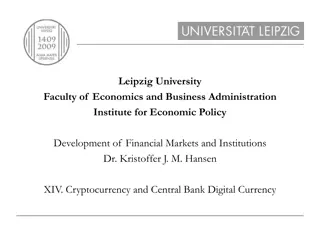

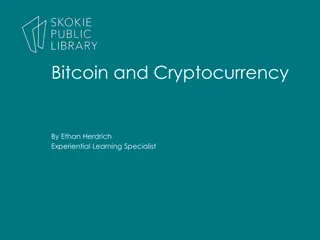





![101 Reviews How to Recover Lost Bitcoin [Scammed/Stolen Funds]](/thumb/153354/101-reviews-how-to-recover-lost-bitcoin-scammed-stolen-funds.jpg)











